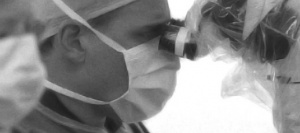HEALTH - FOCUS ON YOUR HEALTH
Ask the Spine Surgeon
April, 2015 - Issue #126
QUESTION:
Hi Doc! I'm a 26-year-old man who has been recently diagnosed with a Chiari malformation. Didn't see that coming! I have been experiencing radiating neck pain, dizziness, nausea and ear ringing. My neurologist suggests that we treat the symptoms with medications, but I'm young and don't want to take pills for the rest of my life. I'd like to consider surgery. I'm otherwise in good health. What do you think?
I'm sorry to hear that you're experiencing symptoms from this congenital defect. Many, while born with this malformation, never notice that they have a deformation of the skull.
Before I answer your question, let me catch everyone up on what we're talking about. A Chiari malformation is a congenital defect - meaning it's present at birth - in the back of the head where the spinal cord and brain connect. The lower portion of the skull, the posterior fossa, can be too small to adequately hold the lower part of the brain. The compression of the spinal cord and brain stem hinders the flow of spinal fluid, which can cause symptoms like you describe because the tonsils of the cerebellum are forced to protrude into the spinal column. A protrusion of the cerebellar tonsils only has to impede into the spinal canal by 1 millimeter to produce symptoms.
What you're experiencing is quite common for this diagnosis. Symptoms of Chiari malformations are typically not experienced until a person is in their 20s or 30s, though symptoms can develop sooner or later depending on the cerebellar protrusion. When you read through the varied list of possible symptoms, you can see why a Chiari malformation is often misdiagnosed.
Symptoms can include, most commonly, a headache that begins in the back of the head and radiates behind the eyes. Bending forward, sneezing, laughing and coughing can worsen the headache. Radiating neck pain down the spine and across the shoulders is also a frequent symptom. Other symptoms include double vision, sensitivity to light, blind spots, ringing in the ears, hearing loss, vocal changes, dizziness, vertigo, nausea, clumsiness, difficulty swallowing, foggy thinking, poor memory, impaired concentration and frequent or urgent urination.
The Chiari malformation diagnostic process begins with a complete medical history examination and physical examination. That process is followed by a neurological evaluation that will identify specific symptoms and neurological functioning. I'm hoping that you also had an MRI, as it's the best diagnostic tool for detecting Chiari malformations. I can't stress enough that it's essential that other conditions to be ruled out. You should have a brain MRI to ensure that you don't have a tumor that could be causing pressure in the skull. An MRI of the spinal cord could be warranted, too, as a mass there could also create similar symptoms. Many individuals with a Chiari malformation suffer for years, experiencing misdiagnosis after misdiagnosis, which is why it's vital to be seen by a neurosurgeon who can effectively evaluate the results of your radiographic workups.
If it can be determined that the Chiari malformation is what's causing your symptoms, and if your symptoms are impeding your quality of life, surgery should be "on the table." You say that your doctor suggested coping with your symptoms through medication, though. That might be because he or she believes surgery would be difficult or that your symptoms are too mild to warrant it.
It seems you disagree, which is why we should talk. Since you have experienced persistent symptoms despite observation, you should be evaluated by a specialist; you may require further workups, imaging and a detailed neurological exam. Depending on what type of Chiari malformation you have (There are three.), surgery would involve operating on your upper spinal area and/or skull. That sounds worse than it is, though. In my office, these procedures are done using minimally-invasive methods. And, because Chiari malformation surgery creates more room for the brain, relieves compression of the brain stem and spinal cord and allows the spinal fluid to travel adequately, you should experience a total reversal in your symptoms.
I always prefer the most conservative options and believe that surgery should be a last resort, but I understand why you are opposed to taking pills for the remainder of your life. Call my office and let's set up a time to discuss this further.
Kapil Moza MD, FACS
Diplomate, American Board of Neurological Surgery
Dr. Moza's Santa Clarita office is conveniently located in Valencia. 805-497-3622
Hi Doc! I'm a 26-year-old man who has been recently diagnosed with a Chiari malformation. Didn't see that coming! I have been experiencing radiating neck pain, dizziness, nausea and ear ringing. My neurologist suggests that we treat the symptoms with medications, but I'm young and don't want to take pills for the rest of my life. I'd like to consider surgery. I'm otherwise in good health. What do you think?
 |
Before I answer your question, let me catch everyone up on what we're talking about. A Chiari malformation is a congenital defect - meaning it's present at birth - in the back of the head where the spinal cord and brain connect. The lower portion of the skull, the posterior fossa, can be too small to adequately hold the lower part of the brain. The compression of the spinal cord and brain stem hinders the flow of spinal fluid, which can cause symptoms like you describe because the tonsils of the cerebellum are forced to protrude into the spinal column. A protrusion of the cerebellar tonsils only has to impede into the spinal canal by 1 millimeter to produce symptoms.
What you're experiencing is quite common for this diagnosis. Symptoms of Chiari malformations are typically not experienced until a person is in their 20s or 30s, though symptoms can develop sooner or later depending on the cerebellar protrusion. When you read through the varied list of possible symptoms, you can see why a Chiari malformation is often misdiagnosed.
Symptoms can include, most commonly, a headache that begins in the back of the head and radiates behind the eyes. Bending forward, sneezing, laughing and coughing can worsen the headache. Radiating neck pain down the spine and across the shoulders is also a frequent symptom. Other symptoms include double vision, sensitivity to light, blind spots, ringing in the ears, hearing loss, vocal changes, dizziness, vertigo, nausea, clumsiness, difficulty swallowing, foggy thinking, poor memory, impaired concentration and frequent or urgent urination.
The Chiari malformation diagnostic process begins with a complete medical history examination and physical examination. That process is followed by a neurological evaluation that will identify specific symptoms and neurological functioning. I'm hoping that you also had an MRI, as it's the best diagnostic tool for detecting Chiari malformations. I can't stress enough that it's essential that other conditions to be ruled out. You should have a brain MRI to ensure that you don't have a tumor that could be causing pressure in the skull. An MRI of the spinal cord could be warranted, too, as a mass there could also create similar symptoms. Many individuals with a Chiari malformation suffer for years, experiencing misdiagnosis after misdiagnosis, which is why it's vital to be seen by a neurosurgeon who can effectively evaluate the results of your radiographic workups.
If it can be determined that the Chiari malformation is what's causing your symptoms, and if your symptoms are impeding your quality of life, surgery should be "on the table." You say that your doctor suggested coping with your symptoms through medication, though. That might be because he or she believes surgery would be difficult or that your symptoms are too mild to warrant it.
It seems you disagree, which is why we should talk. Since you have experienced persistent symptoms despite observation, you should be evaluated by a specialist; you may require further workups, imaging and a detailed neurological exam. Depending on what type of Chiari malformation you have (There are three.), surgery would involve operating on your upper spinal area and/or skull. That sounds worse than it is, though. In my office, these procedures are done using minimally-invasive methods. And, because Chiari malformation surgery creates more room for the brain, relieves compression of the brain stem and spinal cord and allows the spinal fluid to travel adequately, you should experience a total reversal in your symptoms.
I always prefer the most conservative options and believe that surgery should be a last resort, but I understand why you are opposed to taking pills for the remainder of your life. Call my office and let's set up a time to discuss this further.
Kapil Moza MD, FACS
Diplomate, American Board of Neurological Surgery
Dr. Moza's Santa Clarita office is conveniently located in Valencia. 805-497-3622
|
||||||||||||||||||||||||||||





